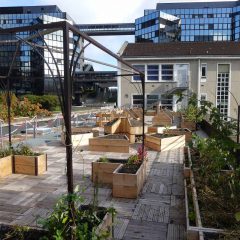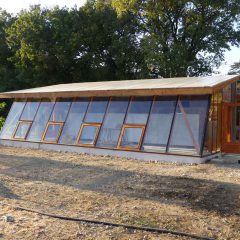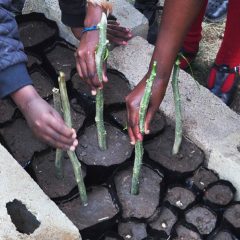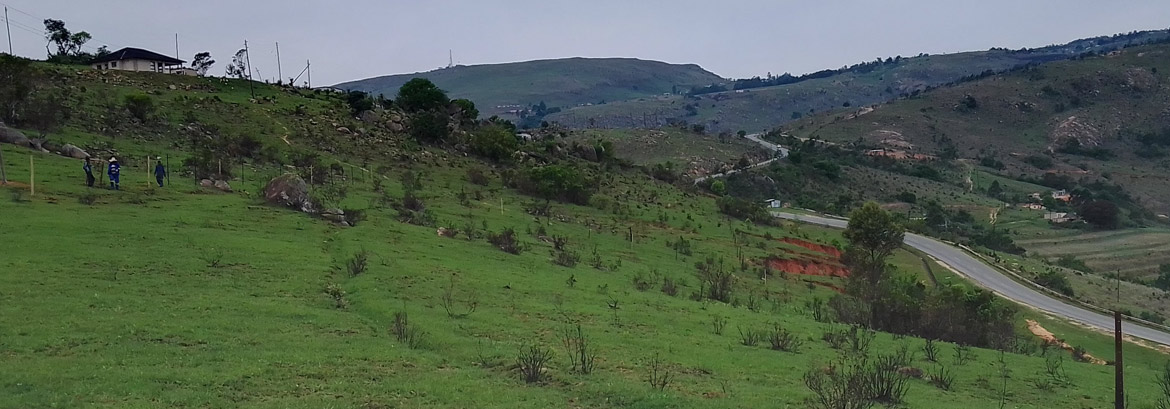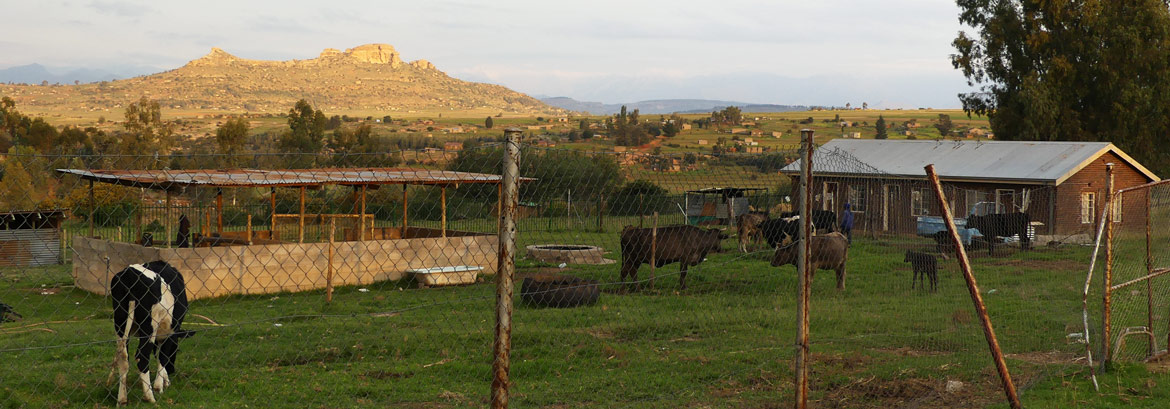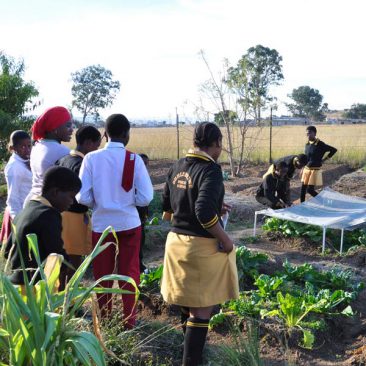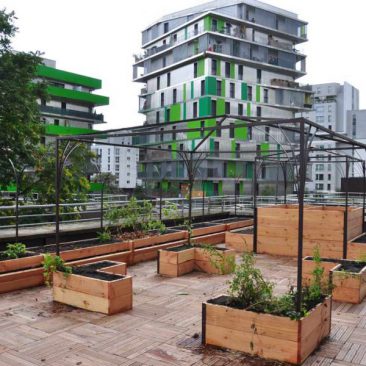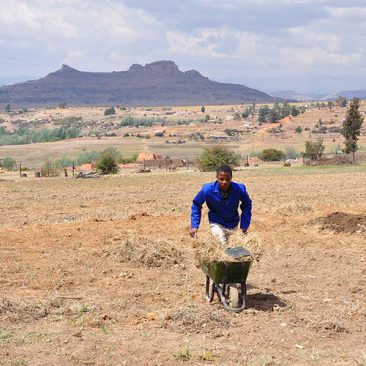Designing Hope created TransJardins to encourage exchanges of experience between community garden initiatives, educational gardens that work to popularize agroecology, permaculture and agroforestry techniques in Africa.
Transjardins also aims to create “agri-cultural” bridges between these African projects and similar initiatives in Europe, in order to promote other types of exchanges, to encourage volunteers to get involved in Africa, to create North/South links between children to encourage the understanding of the culture of the other.
- In Lesotho, a school for the deaf and hard of hearing is involved, with a garden aiming at raising young people’s awareness of agricultural activities, as well as an agroforestry pilot garden on the outskirts of Maseru developed by The Ivory Foundation and APAF International.
- In Burkina Faso, Designing Hope develops an educational agroforestry garden also involving a kindergarten in collaboration with APAF Burkina at the Laafi center in Koudougou , and The Ivory Foundation supports the establishment of a pedagogical garden in the school of Yagma in the outskirts of Ouagadougou.
- In Senegal, The Ivory Foundation supports a school farm in Dawady, in the region of Tambacounda (eastern Senegal), as well as 5 community gardens located around this city.
- In South Africa, the Roosboom garden is developed for young orphans in a day care home.
- In Swaziland, 6 schools are involved, with 1000 children associated with a pedagogical project that also provides vegetables for the canteen.
Transjardins also allows young people from different countries to exchange experiences. And beyond agriculture, this blog also aspires to create openings to other cultures, and human ties between children
Below is a presentation of the various projects associated to date:.
Rufisque Garden – Senegal
Designing Hope used its experience in creating an educational vegetable garden to help the inclusive school Petits Princes d'Handiscole, located in Rufisque, on the outskirts of Dakar, in the creation of a vegetable garden on its 60m2 roof terrace. . Click here to find out more about this garden.
Click here to discover RUFISQUE garden
Roosboom Garden – South Africa
The Roosboom garden is part of a day care centre for underprivileged children supported by Designing Hope since 2007. The children are welcomed after school and receive a daily hot meal. The maintenance of the garden involves the children, and participates in the preparation of the meals. Click here to find out more about this garden.
Click here to discover Roosboom garden
Garden of Skills, Malanti – Eswatini
The garden of Malanti is part of the "Garden of Skills" innovative project initiated by Designing Hope in 2020 with th support of Bon Marché Rives Gauche. It consists in associating on one site a "Garden Forest", in the middle of which will be built an activity and training centre in the fields of agroecology, agroforestry, craftsmanship, and micro-project management. Click here to learn more about this project.
cliquez ici pour découvrir le jardin de Malanti
Macambeni Garden – Eswatini
In 2017, Designing Hope is developing with the support of The Ivory Foundation an educational garden in Macambeni, an underprivileged neighborhood in the city of Piggs Peak. Its goal is multiple: to train women from this neighborhood in sustainable agriculture techniques, to provide fresh vegetables for the neighborhood's kindergarten, as well as for HIV-positive patients at the hospital. Click here to learn more about this garden.
Click here to discover the Macambeni garden
Hlohlo School Gardens – Eswatini
Since 2012, Dessine l'Espoir has been collaborating with several rural schools around Piggs Peak. This support is multifaceted: awareness campaigns, donations of school uniforms to the most underprivileged children, but also nutritional support and training in agroecology. For this, Designing Hope has financed the establishment of enclosed gardens, the salary of a person in charge for each garden, the supply of seeds, and sometimes even access to water when necessary. Click here to find out more about the Hlohlo school gardens.
CLICK HERE TO DISCOVER THE SCHOOL GARDENS IN ESWATINI
St Monica pedagogical farm – Lesotho
The educational farm of St Monica is a structure welcoming deaf and hard of hearing students trained in agroecology, to help them to start up independently and become self-sufficient. Click here to know more about this garden.
CLICK HERE TO DISCOVER ST MONICA’S FARM
Garden of St Paul School for the Deaf – Lesotho
St Paul's School is located in Leribe, northern Lesotho, and brings together 200 children aged 5 to 14, deaf and dumb, from rural areas and very disadvantaged backgrounds. The educational farm was set up with the support of The Ivory Foundation in 2015, in order to develop professional opportunities for out-of-school youth. Click here to know more about this garden.
CLICK HERE TO DISCOVER ST PAUL’S GARDEN
La Traversine Garden – France
La Traversine is an educational garden developed in 2017 on the roof of the Bercy school in the 12th arrondissement in Paris by Desigining Hope as part of the "Parisculteurs", a call for projects launched by the Paris City Council to green roofs, terraces and land in the capital. In 2020, after starting out on the school terrace, the Traversine takes root in the elementary school playground with La Traversine #2. Click here to find out more about this garden.
CLICK HERE TO DISCOVER THE GARDEN OF LA TRAVERSINE BERCY
Traversine Villiot garden – France
In 2021, Designing Hope has been entrusted by Paris Habitat (Paris social housing organisation) to organise and run a 300 m2 garden in the heart of the Villiot-Rapée residence for a period of four years. The aim is to make it a place for living and discovering biodiversity and nature, for the children of the residence, but also occasionally for young visitors from the neighbourhood. A circular Green Theatre in the centre of the garden is intended to welcome the children of the “Centre Paris Amin” (CPA) of the neighbourhood on Wednesday afternoons, to carry out discovery activities around nature (land art, mime, open-air theatre…). A Mandala garden, growing trays and greenhouses will soon be completing the garden. Click here to find out more about this garden.
CLICK HERE TO DISCOVER THE GARDEN OF LA TRAVERSINE VILLIOT
Le Grand Potager de Fontenille – France
A vegetable garden of 4500m2, laid out on an organic wine-growing estate, in the privileged setting of the Luberon. The Grand Potager welcomes schoolchildren from the surrounding schools to raise their awareness of biodiversity and sustainable agriculture techniques. Find out more about this garden.
CLICK HERE TO DISCOVER LE GRAND POTAGER DE FONTENILLE
Yagma Garden – Burkina Faso
A vegetable garden of 4000m2, built on a deserted plot of land around the school of Yagma, in the suburbs of Ouagadoudou. This garden was set up by The Ivory Foundation, with the expertise of APAF, to set up a pilot garden in agroforestry. This garden aims to change the environment of these children, by providing them with a pleasant and green working environment, while raising their awareness of this innovative agricultural approach and providing vegetables for the school canteen. Find out more about this garden.
CLICK HERE TO DISCOVER YAGMA GARDEN
Focus

Garden your Health !
Visites & Echanges
Approches durables
Transgardens is an initiative of Designing Hope started in 2013, bringing together educational and experimental gardens from several countries in Africa and France. Designing Hope has always promoted family farming in its projects. One of the early project in South Africa aimed at encouraging “Door Gardens”, (family garden of the size of a door) that can be grown outside the house, even in a township with only little ground around the shacks. Since 2013, Designing Hope has launched a training program to permaculture techniques and agroecology. This knowledge promotes access to nutritionally balanced meals, in a context of physical fragility, poverty and rise of food prices, accentuating malnutrition. Reproducible seeds are made available, and training on seeds conservation enable families to be self sufficient over time.



